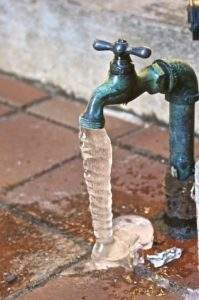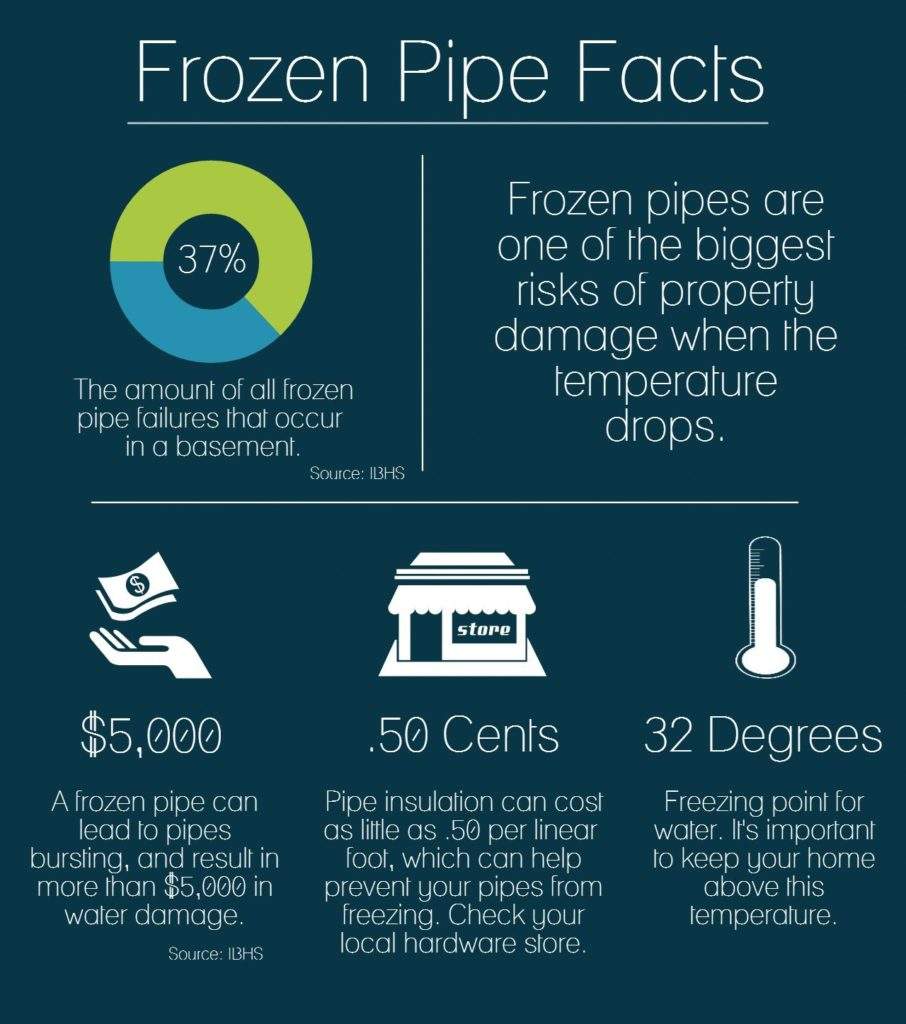Winterization Checklist: Avoid Costly Water Damage
The Denver Metro Area continues to enjoy above average temperatures for October and November. These unseasonably warm temperatures can lead some homeowners to procrastinate their fall winterization. Unfortunately, La Nina is expected to visit colder temperatures upon the Denver area – much colder than last year – throughout December and January 2017. Harsh winter weather increases the risk of water damage freezing pipes. We’ve put together this Winterization Checklist to help you avoid costly water damage.
Inspect for Exposed / Vulnerable Pipes

Building Research Council at the University of Illinois has identified the “temperature alert threshold” to be 20 degrees F. The onset of freezing occurred in uninsulated pipes installed in an unconditioned attic when the outside temperature fell to 20 degrees F. Freezing incidents can occur with temperatures above 20 degrees F, especially in pipes exposed to cold, flowing air due to of cracks in an outside wall or lack of insulation. Pipes in attics, crawl spaces and outside walls are all vulnerable to freezing, especially if there are cracks or openings – for example where television, cable or telephone lines enter – that allow cold, outside air to flow across the pipes.
Pipes do not typically break where the ice blockage occurs. Rather, continued freezing and expansion inside the pipe causes water pressure to increase downstream — between the ice blockage and a closed faucet. The increase in water pressure leads to pipe failure. Upstream from the ice blockage the water can always retreat back towards its source, so there is no pressure build-up to cause a break.
Cracks and holes in outside walls and foundations near water pipes should be sealed with caulking to keep cold wind away from the pipes. Keep kitchen and bathroom cabinet doors open during cold spells to let the warm air circulate around the pipes, especially if pipes are under sinks and adjacent to outside walls.
Let the Water Run
A dripping faucet drip during extreme cold weather can prevent a pipe from bursting. Opening a faucet provides relief from the excessive pressure that builds between the faucet and the ice blockage when freezing occurs. The drip can be very slight. Even the slowest drip at normal pressure will provide pressure relief when needed. Where both hot and cold lines serve a spigot, make sure each one contributes to the drip, since both are subjected to freezing. If the dripping stops, leave the faucet(s) open, since a pipe may have frozen and will still need pressure relief.
Sprinkler Blowout
Preparing your lawn sprinkler system for winter is critical to prevent costly water damage to your home. Winter temperatures cause water remaining in your sprinkler system to turn to ice. The expanding pressure of the ice causes pipes and fittings to burst and valves to crack. Water discharged from a burst pipe or valve can be substantial, saturating soil in and around the building foundation. Moisture seeping into the house can cause mold and other damage. Even if you have drained the water out of your irrigation system, some water remains and can freeze, expand, and crack piping. Freezing water in the backflow assembly will damage the internal components and can crack the brass body. To minimize the risk of freeze damage, be sure to winterize your irrigation system.
· Prepare your outdoor sprinkler systems for winter by expelling ALL of the water from the irrigation system and equipment
· Disconnect hoses from outside spigots
Gutter Maintenance
Gutters are designed to do one thing — channel water away from the foundation — and they’re critical to protecting the structural integrity of your house. But in order for gutters to do their job properly, they have to be kept in shape and free of clogs, holes, and sags. Luckily, most common gutter problems are easy to fix. And it’s worth the effort! “Gutters are one of those things where routine maintenance and inspecting them can really prevent bigger problems down the road,” says Jason Stutzman, director of home maintenance and repair for Brothers Redevelopment in Denver.
· Clogged gutters is very common. Left untended, gutters and downspouts get so clogged with debris that they are, essentially, useless. Gutters should be cleaned out at least once per year; twice per year if you have a lot of trees nearby. If you have chronically clogged gutters, you might want to install gutter covers – mesh screens, clip-on grates, or porous foam. They still need regular maintenance, though.
· Leaky gutter joints can be sealed by caulking the joint from the inside with gutter sealant. A tube costs about $5. Very small holes can be filled with gutter sealant. Larger holes will require a patch.
· Ensure that downspouts extend several feet away from the house, or they’ll dump right into the basement. If necessary, attach gutter extensions to the bottom of the downspout to discharge water well beyond the foundation. They’re inexpensive and easy to install.
If you suspect a frozen pipe

If you open a faucet and no water comes out, don’t take any chances. Call Abbotts. 303-975-4000. With 24 / 7 Emergency Response we’ll be on-site to assess your situation in 60 minutes. Abbotts has the equipment, personnel and know-how to address your water damage and safeguard your property.
Acting quickly will help to minimize the damage. The sooner the location is dried, cleaned and restored, the lower the risk of hazardous mold growth. If a water pipe bursts, turn off the water at the main shut-off valve (usually at the water meter or where the main line enters the house) and leave the faucet(s) open to reduce the pressure until repairs are completed. Don’t try to thaw a frozen pipe with an open flame; as this will damage the pipe and may even start a building fire.
We’ll be there when you need us!
